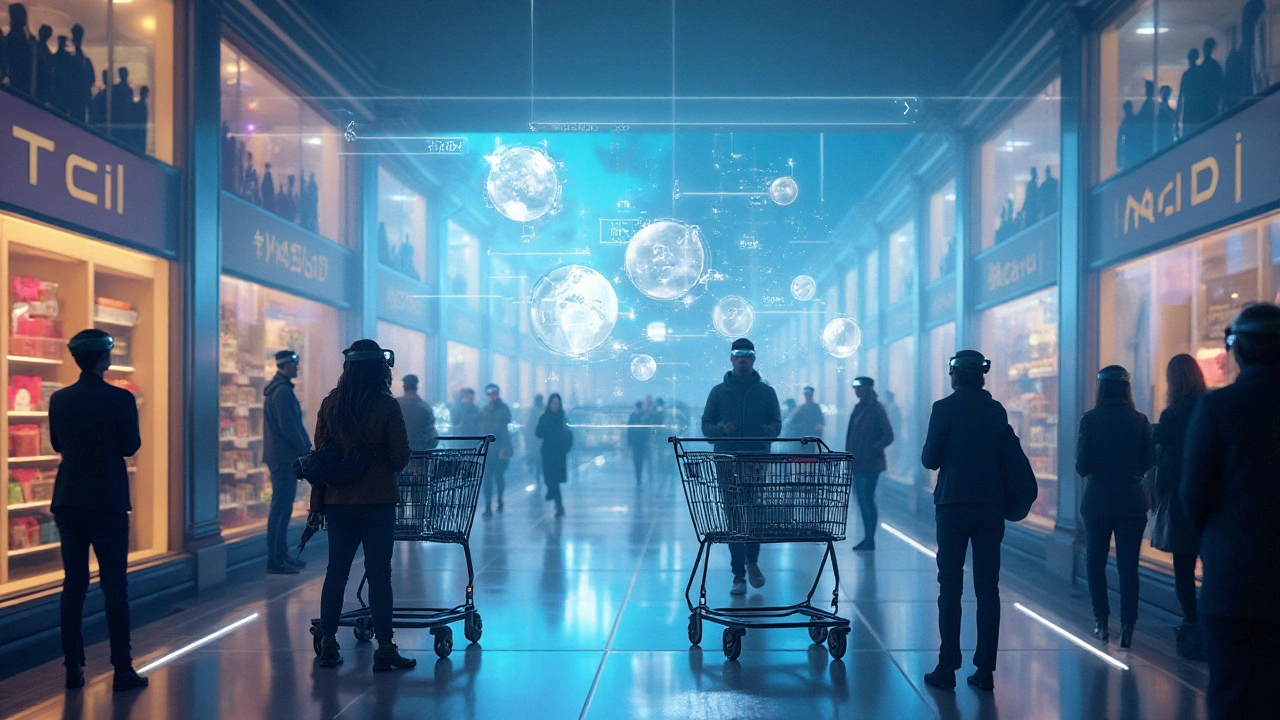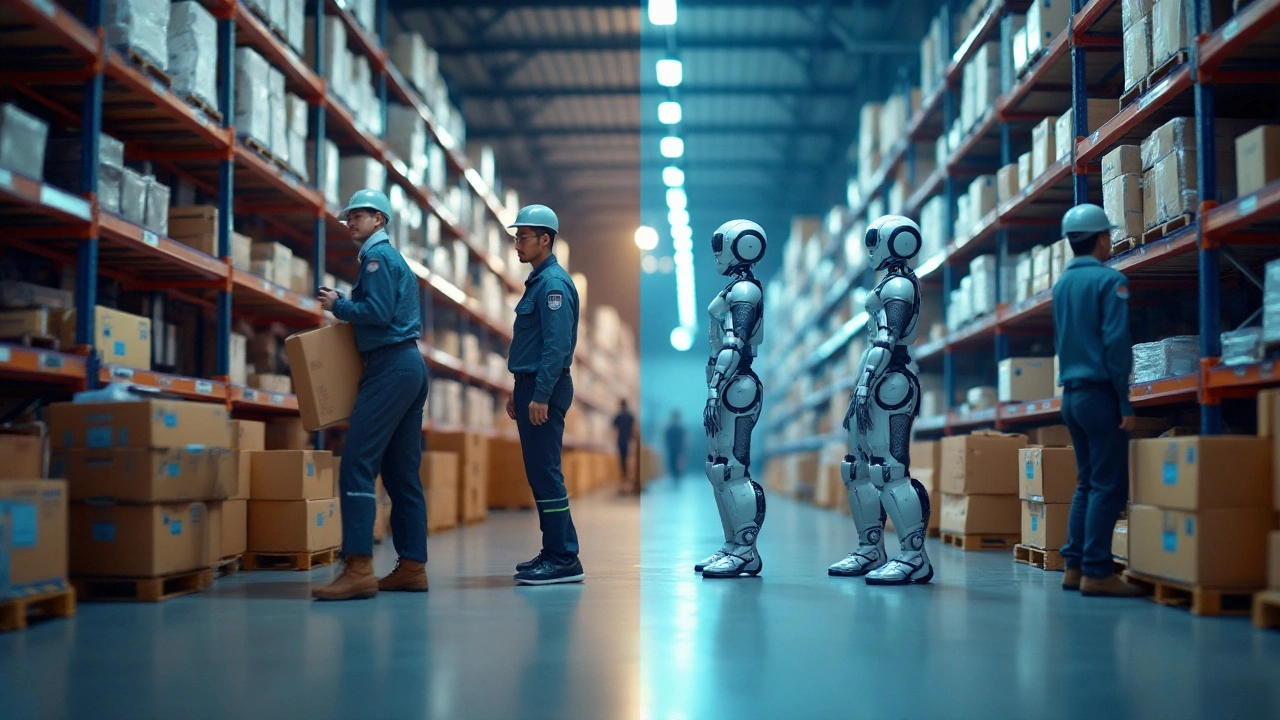Revolutionizing E-commerce with Artificial Intelligence: Future Trends and Innovations

In today's fast-paced digital world, the role of artificial intelligence in e-commerce is nothing short of groundbreaking. As technology continues to shape the future, AI stands at the forefront, offering innovative solutions that blur the lines between online shopping and human interaction.
Imagine a shopping experience so tailored to your preferences, it's as if the store was built just for you. This is precisely what AI is making possible. From chatbots providing immediate assistance to algorithms that predict upcoming trends, AI is changing the way we connect with products and services.
Businesses are quickly adapting to these advancements, not just to stay afloat but to push boundaries and redefine consumer interactions. As AI technologies continue to evolve, they promise to unlock unprecedented opportunities in the realm of e-commerce, ushering in a new era of digital retail we've only just begun to explore.
- AI and Personalized Shopping Experiences
- AI-Powered Customer Service and Support
- Inventory Management and Supply Chain Optimization
- Predictive Analytics and Future E-commerce Trends
AI and Personalized Shopping Experiences
In the vibrant world of e-commerce, personalization has emerged as a game-changer, shifting the spotlight from traditional shopping methods to highly curated and individualized online journeys. Imagine walking into a digital store where each product seems handpicked just for you. This personalized shopping experience is made possible by the power of AI in e-commerce. AI-driven personalization tools analyze vast datasets to identify customer preferences and behaviors. As consumers navigate online platforms, AI algorithms constantly learn from every click, purchase, and search to offer tailored recommendations that not only align with individual tastes but anticipate future desires.
What truly sets AI apart in this regard is its ability to transcend mundane data analytics, transforming numbers into actionable insights. Machine learning, an integral component of AI, allows these systems to evolve continuously, ensuring that personalization becomes more accurate over time. Imagine browsing for a pair of shoes; the AI doesn’t just push similar products—it considers your past choices, recent trends, and even the weather forecast to suggest the perfect pair, each decision informed by data-driven insights. It’s like having a personal shopper who knows you better than you know yourself.
The ripple effect of personalized shopping extends beyond customer satisfaction. Businesses harnessing AI technologies witness increased engagement and higher conversion rates, as users are more likely to indulge in a shopping experience that feels unique and intuitive. According to a report by Accenture, 75% of consumers are more likely to purchase from retailers that recognize their name, remember their preferences, and recommend options based on past purchases. This statistic underscores the undeniable impact of personalization on consumer behavior and brand loyalty.
"Personalization is not just a feature, it’s the future," suggested Brian Solis, a principal analyst at Altimeter Group, emphasizing the strategic importance of personalization in digital commerce.
Implementing AI-powered personalization systems does require an investment in sophisticated technologies and expert personnel, but the potential benefits far outweigh these initial hurdles. Companies can opt for AI tools that integrate seamlessly with existing e-commerce platforms, ensuring the deployment process does not disrupt everyday operations. As personalization becomes increasingly prevalent, businesses that fail to embrace these innovations risk falling behind. In a hyper-competitive landscape, providing a hyper-personalized service experience might just be the differentiating factor between a successful sale and a lost customer.
Even as AI continues to evolve, the scope for personalization is expanding. Voice-activated technologies, augmented reality applications, and virtual assistants are paving the way for even more immersive shopping experiences. With such advancements, the once clear boundaries of personal and digital worlds blend ever more seamlessly. Retailers that can leverage these trends will offer customers a glimpse into the future of shopping, where AI not only anticipates but genuinely enhances the buying journey. For once, it’s okay that the retailer knows who you are—the goal is to make sure you receive exactly what you want, exactly when you need it.

AI-Powered Customer Service and Support
One of the most significant ways AI is reshaping e-commerce is through customer service and support. The integration of AI in E-commerce allows for an unprecedented level of efficiency and personalization in how businesses interact with their customers. At the heart of this transformation are chatbots—smart, automated programs designed to simulate human conversation. These digital helpers are available 24/7, providing instant responses to inquiries, which would otherwise require manpower and time.
Customer service chatbots can handle a diverse range of tasks. They answer frequently asked questions, process refunds, and even offer product recommendations based on user preferences. This ability to provide immediate, customized support has enhanced user satisfaction significantly. Research findings suggest that around 80% of routine questions can be tackled by AI systems, freeing up human agents to focus on more complex issues. The use of AI chatbots not only saves time and resources but also ensures that customer queries are addressed promptly, leading to improved user experiences.
While chatbots are the visible frontline in AI-driven customer support, there's more happening behind the scenes. Machine learning algorithms are analyzing customer interactions to gather valuable insights about consumer behavior. These patterns help businesses anticipate needs, predict trends, and make informed decisions. With the help of AI trends 2025, companies can keep refining their customer support strategies, matching evolving consumer expectations, and delivering seamless service.
"The sophistication level of AI in customer service is reaching new heights. Today, AI systems are capable of understanding nuanced human emotions, enabling the delivery of surprisingly personalized customer experiences," noted industry expert Janice Smith in her recent publication on digital transformation.Moreover, virtual assistants like Amazon's Alexa and Google Assistant are also examples of AI tools enhancing customer service. As voice recognition technology improves, these assistants increasingly facilitate shopping by executing voice commands, managing orders, and offering real-time customer support. According to a recent survey, 55% of households are expected to possess smart speakers in the next five years.
Another key role of AI in customer support is through sentiment analysis. AI systems assess customer feedback and social media interactions to gauge overall sentiment toward a brand. This helps businesses identify issues before they escalate, allowing them to address concerns proactively. By constantly monitoring and adapting to consumer feedback, companies can significantly bolster their brand image.
Despite these advancements, challenges exist. Ensuring data privacy and managing user expectations are critical for successful AI implementation. E-commerce platforms must strike a balance between automation and personal touch, maintaining the human element in customer interactions. By understanding these dynamics and nurturing a seamless blend of technology and humanity, digital retail can thrive in the future.

Inventory Management and Supply Chain Optimization
The landscape of inventory management has drastically changed with the advent of AI in E-commerce. Traditionally, businesses relied on human insight and historical data to control stock levels, often leading to overstocking or stockouts. Now, thanks to AI, retailers can leverage real-time data analytics to predict and respond to demand with unprecedented accuracy. This transformation ensures that the right amount of product is available at the right time, minimizing waste and maximizing efficiency. AI-driven inventory systems continuously learn from purchasing behaviors, patterns, and external factors such as seasonal trends or weather changes, offering businesses a robust tool to optimize their supply chains.
AI-powered logistics focuses on reducing inefficiencies within the supply chain. By analyzing routes, delivery schedules, and transportation methods, AI applications can identify bottlenecks and suggest alternatives that save time and cost. A McKinsey report suggests that AI could potentially reduce supply chain forecasting errors by 50% and cut down lost sales opportunities by 65%. This is not only beneficial for the businesses but also enhances customer satisfaction with faster deliveries and accurate order fulfillments. As a result, companies that harness AI in their logistics operations find themselves better prepared to meet consumer demands quickly and effectively.
Let's touch on an additional aspect—automation in warehouses. With smart robots and AI-controlled systems, tasks that once required hours can now be accomplished in minutes. Robots equipped with AI can locate and move products around a warehouse, which streamlines the picking, packing, and shipping processes. These robots work alongside humans, complementing their efforts and taking over repetitive tasks, thus allowing human workers to focus on more complex decision-making aspects. This human-robot collaboration not only boosts productivity but also reduces the likelihood of errors, resulting in smoother warehouse operations.
AI does not stop at just automation and logistics. It plays a crucial role in managing supplier relationships. By utilizing predictive analytics, businesses can anticipate changes in supplier performance and negotiate with more leverage. For example, AI can predict when a supplier might face issues based on historical data and market trends. This foresight enables businesses to make proactive decisions, such as finding alternative suppliers or adjusting order quantities. As noted by Gartner research, organizations that have adopted AI-driven supply chain management have reported a 15% reduction in procurement costs, showcasing the tangible benefits of embracing this technology.
A fascinating development due to AI is implementation of advanced tracking systems and materials management processes. Digital twins, which are virtual replicas of physical supply chains, provide an intricate overview of operations, helping businesses forecast disruptions and plan mitigation strategies well in advance. This technological marvel was once deemed futuristic, but today stands as a reality enabling businesses to operate in a risk-free simulation environment before implementing changes in the real world. Such tools ensure that e-commerce platforms stay agile and responsive to ever-evolving market demands.
"The integration of AI in supply chain logistics has not only accelerated efficiency but has become necessary for sustaining modern e-commerce," states a leading analyst from the International Data Corporation (IDC).
AI's potential in digital retail is boundless as it continues to evolve. The companies that act early in embracing these AI innovations in inventory and supply chain management are likely to secure a competitive position in the market. They set a new standard for efficiency, waste reduction, and sustainability, marking a clear leap into the advanced realm of future commerce. With AI's capabilities still unfolding, it is an exciting time for businesses ready to transform and optimize the way they operate in a connected world.

Predictive Analytics and Future E-commerce Trends
As the digital marketplace expands, predictive analytics becomes the secret weapon of e-commerce titans. This tool converts data into foresight, enabling businesses to anticipate demand, optimize pricing, and enhance their inventory strategies. Imagine you're an online retailer; knowing what your customers want before they want it is no longer in the realm of impossibility. Powerful machine learning algorithms now sift through previous purchase histories, browsing patterns, and even social media interactions to make astonishingly accurate predictions about future buying behaviors.
A significant boon of predictive analytics in AI in E-commerce is its ability to minimize the guesswork in inventory management. Retailers can avoid overstocking or understocking by predicting seasonal sales peaks or identifying which products will be trending. Studies show that companies employing predictive analytics see an average increase in revenue by at least 15%. That number speaks volumes about its effectiveness in supporting data-driven decision-making.
By analyzing the vast pools of data, businesses can also personalize marketing efforts, creating tailored campaigns that engage specific segments of their audience more directly. Consider the impact of receiving personalized offers aligned with your recent searches. It’s not just smart marketing; it significantly boosts the likelihood of conversion and leads to a better customer experience. As one industry leader once said,
"Predictive analytics allows us to know more about our customer's needs than they perhaps do themselves at the moment."
Looking ahead, the trends in predictive analytics signal a more automated and intelligent future. The integration of AI technologies will make these predictions even more precise. As AI systems learn and adapt, they’ll start predicting market trends on a macro level, offering insights into broader shifts within consumer behavior among entire demographics rather than just individuals. This isn't just revolutionizing how retailers stock items but transforming how they conceive their business strategies in today's competitive digital era.
With these advancements, the next wave of innovation in e-commerce isn't just looming—it's arriving at a rapid pace. The businesses ready to adapt will lead, while others may struggle to keep pace. With AI at the helm, redefining the benchmarks of digital retailing, the future never looked so strategically clear and competitively thrilling.